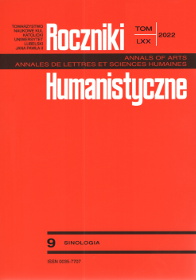Lüshi Chunqiu and the Value-Based Leadership Model in Ancient China
Abstract
The paper presents an analysis of the concepts of leadership in the Lüshi Chunqiu, a 3rd century B.C. text which integrates elements of various schools of political thought of pre-imperial China and thus can be considered as representative of the period. The analysis uses the framework of value-based leadership (VBL) borrowed from modern organisational psychology and leadership studies. Ancient Chinese concepts of leadership are analysed using textual evidence from the Lüshi Chunqiu in three VBL dimensions: ethical, authentic, and servant leadership. The ideal leader in the Lüshi Chunqiu is not a tyrant, but a responsible, well-educated and humble person who perceives moral integrity as a necessary element of his rulership, exhibiting most of the qualities described in the modern VBL model. He is a credible role model, enjoying the strong support of the people and surrounded by virtuous and talented individuals, highly motivated to serve him. Such a leader advocates a long-term management perspective, and is strongly supportive of his subjects’ personal development. He gives plenty of space to open critique and the autonomous decisions of experts and sages to whom he delegates his power. In the Lüshi Chunqiu, such a VBL approach is considered far more effective in the long-term than transactional leadership or rule by force and coercion. Therefore, it is recommended in the text not only on moral, but also pragmatic grounds as a practical recipe for success, both for the ruler and for his country.
References
Brown, Michael E., Linda K. Treviño, & David A. Harrison. “Ethical Leadership: A Social Learning Perspective for Construct Development and Testing.” Organizational Behavior and Human Decision Processes vol. 97, no. 2, 2005, pp. 117–134. DOI: doi.org/10.1016/ j.obhdp.2005.03.002.
Chang, Sin Mun, Pawan Budhwar, & Jonathan Crawshaw. “The Emergence of Value-Based Leadership Behavior at the Frontline of Management: A Role Theory Perspective and Future Research Agenda.” Frontiers in Psychology, vol. 12, May 2021, article 635106, pp. 1-21. DOI: doi.org/10.3389/fpsyg.2021.635106.
Chen, Chao-Chuan, & Yueh-Ting Lee. Leadership and Management in China. Philosophies, Theories and Practices. Cambridge University Press, 2008.
Deng, Shuxia 鄧淑霞. „Lüshi Chunqiu zhong de lingdaoxue sixiang ji qizai dangdai de jiejian yiyi.” 呂氏春秋中的領導學思想及其在當代的借鑒意義. The Journal of Harbin Committee School of the CPP 哈爾濱市委黨校學報 no. 2, 2014, pp. 62-67.
Ehrhart, Mark G. “Leadership and procedural justice climate as antecedents of unit-level organizational citizenship behavior.” Personnel Psychology, vol. 57, no. 1, 2004, pp. 61-94. DOI: doi.org/10.1111/j.1744-6570.2004.tb02484.x.
Eva, Nathan, Mulyadi Robin, Sen Sendjayac, Dirkvan Dierendonck, & Robert C. Lidene. “Servant Leadership: A Systematic Review and Call for Future Research.” The Leadership Quarterly, vol. 30, no. 1, 2019, pp. 111-32, DOI: doi.org/10.1016/ j.leaqua.2018.07.004.
Fang, Jun 方軍. „Lüshi Chunqiu yu xiandai qiye lingdao.” 呂氏春秋與現代企業領導. Journal of Anhui Electric Power University for Staff 安徽電力職工大學學報 vol. 7, no. 2, June 2002, pp. 64-66.
Gardner, William L., Claudia C. Cogliser, Kelly M. Davis, & Matthew P. Dickens. “Authentic Leadership: A Review of the Literature and Research Agenda.” The Leadership Quarterly vol. 22, no. 6, 2011, pp. 1120–1145. DOI: doi.org/10.1016/j.leaqua.2011.09.007.
Greenleaf, Robert K. Servant Leadership. Paulist Press, 1977.
Guo, Moruo 郭沫若. Shi pipan shu 十批判書. Renmin chubanshe, 1954. Reprint in Lüshi Chunqiu xueshu dang’an, edited by Wang Qicai, Wuhan University Press, 2015, pp. 162-218.
Knoblock, John, & Jeffrey Riegel. The Annals of Lu Buwei: A Complete Translation and Study. Stanford University Press, 2000.
Kong, Lingmei 孔令梅, Zhaoneng Wu 吳兆能. „Lüshi Chunqiu de guande xiuyang ji qi dangdai qishi.” 呂氏春秋的官德修養及其當代啟示. Journal of Hainan Normal University 海南師范大學學報 vol. 2020, no. 1, pp. 122-129.
Lemoine, G. James, Chad A. Hartnell, & Hannes Leroy. “Taking Stock of Moral Approaches to Leadership: An Integrative Review of Ethical, Authentic, and Servant Leadership.” Academy of Management Annals vol. 13, no. 1, 2019, pp. 148-187, DOI: doi.org/10.5465/ annals.2016.0121.
Li, Fuxuan 李富軒, Yan Li 李燕. Zhongguo gudai yuyan shi 中國古代寓言史.Hanwei chubanshe, 1998.
Sellmann, James D. Timing and Rulership in Master Lü's Spring and Autumn Annals (Lüshi Chunqiu). SUNY Press, 2002.
Sima, Qian 司馬遷. Shiji 史記. Chinese Text Project, ctext.org/shiji.
Tang, Bowen. Lü’s Commentaries of History. Foreign Languages Press, 2010.
Wang, Qicai 王啓才. Lüshi Chunqiu yanjiu 呂氏春秋研究. Xueyuan Chubanshe, 2007.
Whitehead, Gordon. “Adolescent Leadership Development: Building a Case for an Authenticity Framework.” Educational Management Administration & Leadership, vol. 37, no. 6, Nov. 2009, pp. 847-872. DOI: doi.org/10.1177/1741143209345441.
Yang, Kuan 楊寬. Zhanguo shi 戰國史. Shanghai renmin chubanshe, 2016.
Zhang, Shuangkang 張雙槺, Guoguang Yin 殷國光, & Chen Tao 陳濤. Lüshi Chunqiu Cidian 呂氏春秋辭典. Shandong jiaoyu chubanshe, 1993.
Zhu, Yongjia 朱永嘉, & Mu Su 肅木. Xinyi Lüshi Chunqiu 新譯呂氏春秋. Sanmin shuju, 1995.
Copyright (c) 2022 Roczniki Humanistyczne

This work is licensed under a Creative Commons Attribution-NonCommercial-NoDerivatives 4.0 International License.





